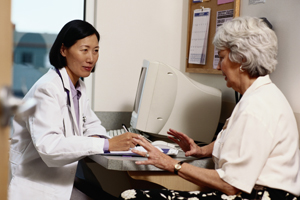
Drug abuse — When to see a doctor
Drug abuse is seen in people of all ages, races, and income levels. Yet, since older adults often use long-term and multiple medications, they have a higher risk of drug abuse. According to the American Geriatrics Society's Foundation for Health in Aging, older adults are most likely to abuse anti-anxiety drugs (such as Valium or Xanax), oral narcotics (such as codeine), or sleeping pills. Some older adults may be abusing drugs without even knowing it. Abusing drugs can lead to:
- Falls (and possibly broken bones or brain injury)
- Car accidents
- Addiction
- Life-threatening drug interactions
If you're using a higher dosage or using your drugs more often than your doctor recommends, you may have a problem. If you think you may have a problem, talk to your doctor. It is nothing to be ashamed of, and your doctor can help.
If you are giving care to a loved one who lives on his or her own, monitoring prescription and over-the-counter drug use is not easy. But if you suspect your loved one is misusing medicines, it's important to take action. Ask your loved one about the medicines she or he uses, what they are for, and how your loved one keeps track of daily use. Don't hesitate to consult with your loved one's doctor as well.
More information on drug abuse — when to see a doctor
Explore other publications and websites
-
Age Page: Medicines: Use Them Safely — This publication describes the difference between prescription drugs and over-the-counter (OTC) drugs. It also offers tips to avoid safety risks and get the best results from your medication at home, at the doctor's office, and at the pharmacy.
http://www.nia.nih.gov/HealthInformation/Publications/medicines.htm
-
Medicines and You: A Guide for Older Adults — This booklet provides a guide for older Americans on how to keep track of and safely use prescription and over-the-counter medications.
http://www.fda.gov/Drugs/ResourcesForYou/ucm163959.htm
Connect with other organizations
-
Center for Substance Abuse Treatment (CSAT), SAMHSA, OPHS, HHS
http://www.samhsa.gov/about/csat.aspx
-
National Institute on Aging, NIH, HHS
http://www.nia.nih.gov/
-
Partnership for Prescription Assistance
https://www.pparx.org/Intro.php
-
Substance Abuse and Mental Health Services Administration
http://www.samhsa.gov/
-
U.S. Food and Drug Administration
http://www.fda.gov/
Content last updated August 12, 2010.
Resources last updated August 12, 2010.
womenshealth.gov
A federal government website managed by the Office on Women's Health in the Office of the Assistant Secretary for Health at the U.S. Department of Health and Human Services.
200 Independence Avenue, S.W. • Washington, DC 20201


 Text size
Text size Email
Email
